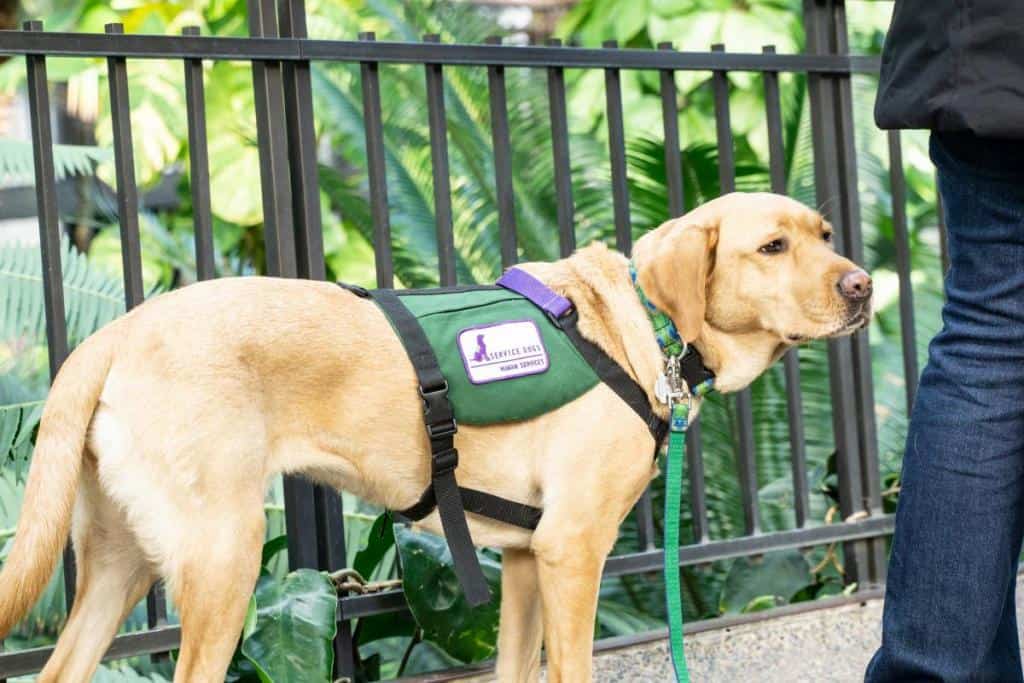The Americans with Disabilities Act (ADA) defines a service animal as “a dog that is individually trained to do work or perform tasks for a person with a disability.”
There are also some limited exceptions for miniature horses.
Service animals are not considered pets, and there are strict laws governing their use.
Furthermore, it is illegal to falsely claim that a pet is a service animal. Doing so can result in significant fines and penalties.
Also, dogs whose sole function is to provide comfort or emotional support do not qualify as service animals under the ADA.
As a consequence, emotional support dogs may not be permitted in some public areas.
However, that will depend on your location because some states have laws allowing people to bring emotional support animals into public places.
Penalties for Refusing a Service Dog
The penalty for violating the ADA provisions can be up to $50,000 for a first offense and up to $100,000 for each subsequent offense.
In addition, the business may be required to pay the person’s attorney’s fees and court costs.
A business that refuses to admit a service dog may also be in violation of state or local laws.
For example, many states have laws that protect people with disabilities from discrimination in public accommodations.
These laws may provide for different or additional penalties than the ADA.
Can I Refuse A Service Dog In My Business?

The answer is no; you cannot refuse a service dog in your business.
A business that refuses to admit a service dog can be sued for discrimination.
If the business is found to have discriminated against a person with a disability, it can be liable for damages under the Americans with Disabilities Act (ADA).
The ADA prohibits discrimination against people with disabilities in public accommodations and requires that businesses make reasonable modifications to accommodate service animals.
Can I Refuse Emotional Support Animals In My Business?
Emotional support animals (ESAs) provide companionship and emotional benefits to their owners.
Unlike service animals, which are trained to perform specific tasks for their owners, ESAs do not have to undergo any special training.
Because of this, some people question whether ESAs are truly necessary or if they are simply a way for people to avoid paying pet fees.
However, emotional support animals are protected under the Americans with Disabilities Act (ADA).
This means that landlords and businesses must make reasonable accommodations for ESAs, such as allowing them into buildings.
In addition, airlines are required to allow passengers to travel with their ESAs.
The ADA does have some limitations though. For example, emotional support animals are not allowed in public places where pets are not normally allowed, such as restaurants and grocery stores.
Suffice to say that emotional support dogs do not enjoy the same level of protection as service animals and it is therefore very unlikely to be penalized for denying them access.
Related Post: Can A Hotel Ask For Proof Of Service Dog?
The Exception to the Rule
Even though service dogs should not be denied admission to business premises or a public space, there are some exceptions.
A service dog that is causing a disturbance or is not under the control of its handler can be asked to leave.
Any form of aggression from the dog can cause it to be denied admission without any legal ramifications.
Also, if a business has a legitimate health or safety reason for excluding a service dog, it may do so. For example, service dogs are not allowed in areas where food is prepared because of the risk of contamination.
In addition, pets are not service animals. So, even though a business is not allowed to deny a service animal entry, they can continue enforcing their no-pets policy.
Pet parents are not allowed to pretend that their pet is a service animal as this is also a violation of the law and it could land you in hot soup.
Related Post: Where Are Service Dogs Not Allowed?
Etiquette 101: Questions You Can Ask About a Service Dog

Service animals are protected and you don’t want to make a costly mistake. For this reason, some etiquette rules should be followed when interacting with a service dog.
The first question you should always ask is whether or not it is okay to pet the dog. Some service dogs enjoy being petted, while others don’t.
The second question you should ask is what the dog is doing. Service dogs are trained to perform specific tasks, such as retrieving items or providing balance support.
Asking what the dog is doing helps to avoid disturbing them while they are working.
Finally, you should ask if the owner needs any assistance. Many times, people will approach a service dog owner and try to help without first asking if they need assistance.
This can be frustrating for the owner and may cause them to feel like they are not able to adequately care for their own service dog.
By following these simple etiquette rules, you can ensure that everyone has a positive experience when interacting with a service dog.
Learn more here:
Final Thoughts
Punishments for refusing service dogs can include legal action, and/or costly fines.
The type of punishment may depend on the severity of the incident and whether it is a first-time offense.
Most states have laws that make it a crime to refuse service to a person with a disability and it is important to know your rights and the laws in your state so that you can take action if you experience discrimination.
Related Posts:
Can Police Ask For Service Dog Proof?
What to Do If Your Service Dog Is Denied Access
As an Amazon Associate, we may receive a small commission from qualifying purchases but at no extra cost to you. Learn more. Amazon and the Amazon logo are trademarks of Amazon.com, Inc, or its affiliates.

